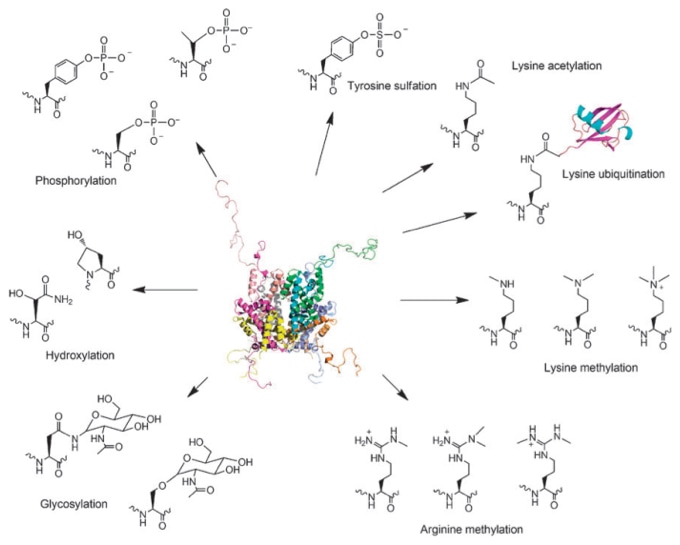As important actors within living cells, proteins serve variety of functions such as catalysis, transport, structural building material and many others. While the human gene set was estimated at, about 25,000 genes, the human proteome size is estimated to be far larger and estimated at over 1 million proteins. Apart from alternative splicing of mRNA as a source of protein diversity, PTMs of proteins further modulate and extend the range of potential protein functions by covalently attaching small chemical groups to selected amino acid residues. More than 400 different types of PTMs have been identified that have variety of effects on cellular functionalities, such as protein stability, metabolism and signal transduction. These modifications include phosphorylation, glycosylation, methylation, acetylation, amidation and many other types. Now, bioinformaticians at Creative Proteomics are glad to tell you we are open to help you with Post-translational Modification Prediction Service!
The following are the common types of Post-translational Modifications:
- Phosphorylation refers to the transfer of a γ-phosphate to an amino acid. It can occur on a number of cytoplasmic and nuclear residues, i.e. on the nitrogen of arginine, histidine or lysine, on the carboxyl group of aspartate, on the hydroxyl group of serine, threonine or tyrosine, or on the sulfhydryl group of cysteine.
- Glycosylation is the reaction in which a carbohydrate is linked to a hydroxyl or other functional group of another molecule. Glycosylation has several types, such as O-linked glycosylation, N-linked glycosylation, Phospho-serine glycosylation, Phospho-serine glycosylation, and C-mannosylation.
- Ubiquitination is an enzymatic process that involves the bonding of an ubiquitin protein to a substrate protein.
- S-Nitrosylation specifically attaches to a thiol group to form an S-nitrosothiol (SNO). S-nitrosylation is an important PTM used by cells to stabilize proteins’ structure, regulate gene expression and provide NO donors, and the generation, localization, and activation of SNOs are tightly regulated.
- N-Acetylation, or the transfer of an acetyl group to nitrogen, takes place in almost all eukaryotic proteins through both irreversible and reversible mechanisms.
- Methylation refers to the modification of proteins through an addition of methyl groups by S-adenosyl methionine dependent methyl transferases.
- Lipidation is a method to attach proteins to membranes in organelles, vesicles and the plasma membrane.

PTMs prediction analysis service provided by Creative Proteomics, include:
- Phosphorylation site prediction
- Glycosylation site prediction
- N-end site prediction
- Other post-translational modification prediction analysis
How to place an order:

*If your organization requires signing of a confidentiality agreement, please contact us by email
As one of the leading omics industry company in the world! Creative Proteomics now is opening to provide post-translational modification prediction service for our customers. With rich experience in the field of bioinformatics, we are willing to provide our customer first class service! Contact us for all the detailed information!